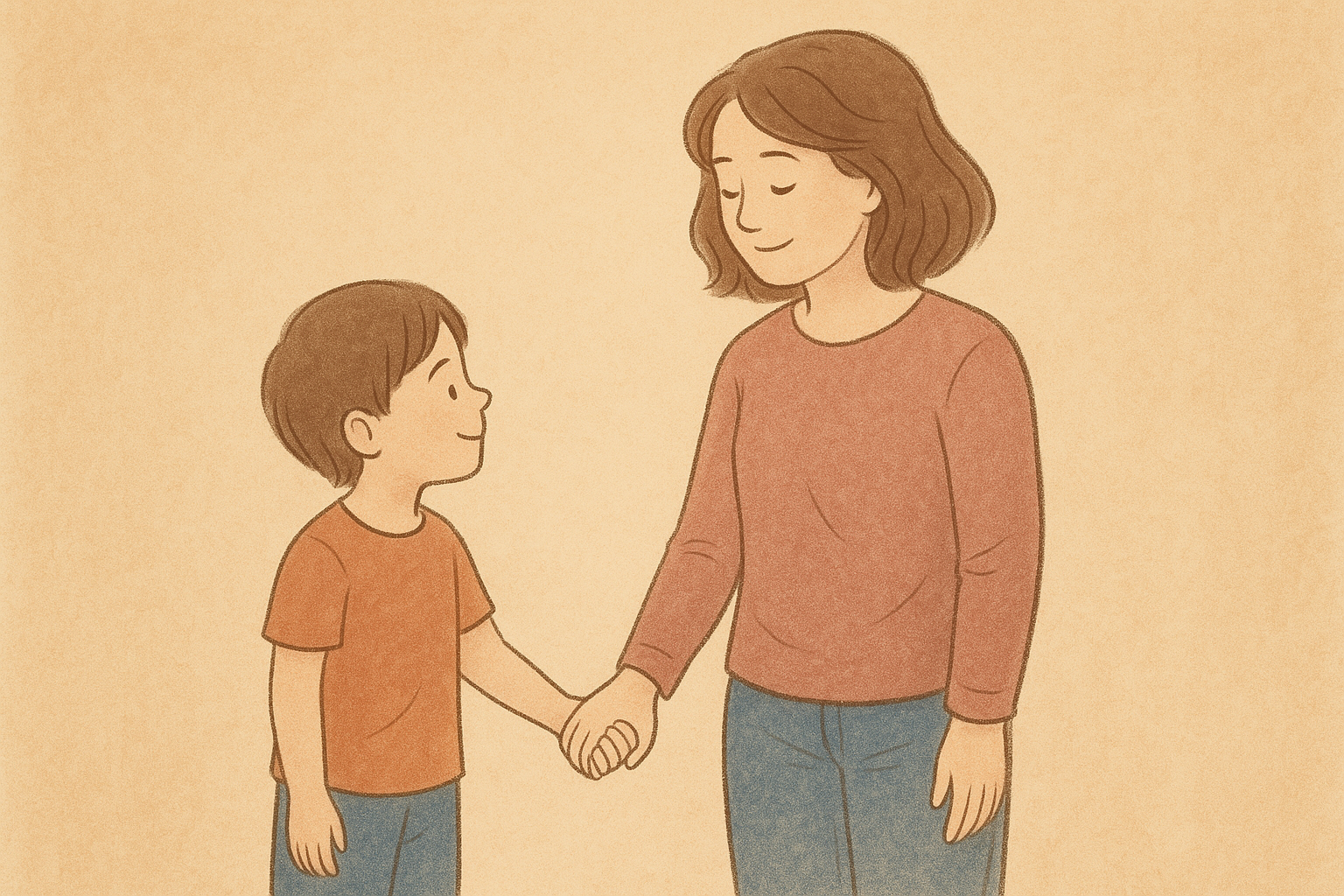Can AI Help with Reparenting? Exploring Healing Childhood Wounds Digitally

What Is Reparenting and Why It Matters
Many of us carry wounds from our childhood, times when we didn’t feel safe, heard, or fully loved. These early experiences can quietly shape our adult lives, influencing how we relate to ourselves and others. Reparenting is the process of giving yourself the care, compassion, and guidance you may not have received as a child. It’s about becoming the nurturing, supportive figure your younger self needed.
This healing practice can be incredibly powerful but also overwhelming. It requires emotional awareness, self-reflection, and consistent compassion. And for many, traditional therapy might feel out of reach or intimidating.
That’s where technology is beginning to step in. As AI mental health tools become more sophisticated and emotionally attuned, a new question is emerging: Can AI help us reparent ourselves?
In this article, we’ll explore how digital tools like Aitherapy are beginning to support emotional healing, especially for those working through childhood wounds. You’ll learn how reparenting works, why it’s important, and how AI might be able to help you along this deeply personal journey.

The Psychology Behind Reparenting
Reparenting is rooted in the idea that parts of us especially those formed in childhood still live within our adult selves. Psychologists refer to this as “inner child work,” and it often reveals patterns of insecurity, fear, and self-criticism that trace back to early experiences of unmet emotional needs.
When a child grows up in an environment where their emotional or physical needs aren’t fully met due to neglect, trauma, instability, or even well-meaning but emotionally distant caregivers they may internalize beliefs like “I’m not safe,” “I’m not good enough,” or “I have to earn love.” These messages don’t disappear with age. They simply evolve into adult behaviors: overworking, people-pleasing, anxiety, perfectionism, or emotional numbness.
Reparenting invites you to meet those younger parts of yourself with compassion. It means talking to yourself in ways that are gentle, patient, validating, and consistent essentially, becoming the parent you needed. This process helps rebuild trust, safety, and emotional resilience from within.
The most powerful reparenting practices include:
- Inner dialogue (talking to your inner child)
- Consistent affirmations and emotional check-ins
- Practicing self-compassion during moments of distress
- Setting healthy boundaries and meeting your own needs

Why So Many Adults Need Reparenting Today
Reparenting isn’t just for those with extreme childhood trauma. It’s something many adults silently need even those who grew up in “normal” households.
Here’s why:
Even loving parents may have struggled with emotional regulation, unhealthy relationship models, or mental health challenges of their own. Add to that the cultural norms of past generations where vulnerability was discouraged, emotions were often dismissed, and children were expected to “toughen up.”
As a result, many adults now carry hidden wounds like:
- Struggling to set boundaries without guilt
- Feeling unworthy of love unless they’re “useful”
- Constantly criticizing themselves in moments of failure
- Avoiding emotional intimacy out of fear of rejection
These patterns don’t mean you’re broken. They mean you adapted to stay safe. But now, those same strategies may be holding you back.
Reparenting is how we shift. It’s how we meet those old survival habits with compassion and choose new ways of relating to ourselves and the people we care about.
That’s why tools like Aitherapy are so relevant: they offer a daily chance to practice being kinder, safer, and more emotionally connected with yourself.
What You Can Learn Through Self-Reparenting
Self-reparenting isn’t just about healing old wounds it’s also about learning entirely new ways to live, connect, and care for yourself. Through this process, you begin to replace outdated survival patterns with intentional habits that support your growth and well-being.
Here are just a few powerful things you can learn:
1. How to Name and Express Your Emotions
Many of us grew up without emotional vocabulary. Self-reparenting teaches you to slow down and ask, What am I feeling right now? Tools like Aitherapy can help by offering prompts and emotion check-ins that gently build your emotional awareness.
2. How to Set Healthy Boundaries
Children who were taught to ignore their needs often grow into adults who struggle to say no. Reparenting helps you reclaim your right to protect your time, energy, and peace without guilt. Aitherapy’s boundary-setting reflections and affirmations can help you practice these skills safely.
3. How to Speak to Yourself with Compassion
If your inner voice sounds like a critic instead of a caregiver, reparenting invites you to change that script. Instead of, “You always mess things up,” you might begin to say, “It’s okay to make mistakes. I’m still worthy.” With consistent practice, these messages become your new normal.
4. What Healthy Relationships Look Like
Our earliest relationships shape what we expect from others. If love once meant chaos, control, or inconsistency, reparenting helps you learn that love can also mean safety, respect, and emotional presence. AI tools can help reinforce these new expectations through daily emotional validation.

The Challenges of Doing Reparenting Work Alone
Reparenting sounds beautiful in theory, showing up for yourself with love, compassion, and stability. But in practice, it can feel overwhelming, confusing, and even painful. That’s because the very wounds you’re trying to heal are the ones that make emotional self-care feel foreign or unsafe.
Many people begin the reparenting journey through books, journaling, or reflection. But quickly, they run into common roadblocks:
- Lack of guidance: It’s hard to know where to start or if you’re “doing it right.”
- Emotional resistance: The inner critic often shows up, saying things like “This is silly” or “You don’t deserve this.”
- Loneliness: Healing childhood wounds alone can feel isolating—especially when those wounds came from not being emotionally supported in the first place.
- Shame and discomfort: Facing unmet needs or past pain can trigger guilt, avoidance, or self-blame.
- Inconsistency: Without structure or encouragement, the work can quickly fade into the background of daily life.
This is where many people either give up or seek external help. But therapy isn’t always accessible due to cost, waitlists, or emotional readiness.
How AI Therapy Supports Reparenting Work
Technology may not be the first thing that comes to mind when thinking about emotional healing, but AI therapy is beginning to offer surprising benefits especially for those doing reparenting work.
At its core, reparenting requires consistency, empathy, and safe emotional reflection. That’s exactly what an AI tool like Aitherapy is designed to provide—anytime you need it, without fear of judgment.
Here’s how AI therapy can support reparenting:
1. A Gentle, Always-Available Presence
AI therapy doesn’t take breaks or require appointments. It’s available 24/7, offering stability and responsiveness two things many people missed growing up. Whether you're feeling anxious late at night or want to practice affirmations in the morning, it’s always there.
2. Cognitive Behavioral Techniques (CBT) That Reframe Inner Dialogue
CBT is a powerful method for changing negative thought patterns many of which come from childhood wounds. Aitherapy is trained in CBT methods and can help you catch and reframe self-critical thoughts with kinder, more balanced perspectives.
3. Modeling Supportive, Reassuring Language
Aitherapy’s emotionally trained responses gently mirror the kind of support you might wish you had heard as a child:
“You’re doing your best.”
“It’s okay to feel this way.”
“You deserve kindness, even when you’re struggling.”
Over time, these messages begin to sink in and reshape your self-talk.
4. Daily Emotional Check-ins & Guided Prompts
Just like a good parent would ask how you’re feeling, Aitherapy can initiate simple emotional check-ins and suggest reparenting prompts, like:
- “What would you tell your 7-year-old self today?”
- “How can you comfort the part of you that’s scared right now?”
What AI Can’t Replace
While AI therapy can be a powerful support tool, it’s important to recognize its limits especially when it comes to deep emotional healing like reparenting.
Reparenting often touches on early trauma, attachment wounds, and formative memories. In some cases, these experiences may involve neglect, emotional abuse, or other complex pain that requires skilled human guidance to unpack safely. AI can offer empathy and structure, but it lacks the full nuance, training, and intuition of a licensed therapist.
Here’s when AI therapy shouldn’t be your only support:
- If you’re dealing with trauma flashbacks, self-harm, or suicidal thoughts
- If your reparenting work brings up intense emotional distress that feels hard to manage alone
- If you feel stuck in patterns that AI reflections can’t shift or address deeply
That said, AI can still be a companion, not a replacement. Many people find that combining AI therapy with journaling, support groups, or occasional sessions with a licensed therapist creates a powerful hybrid approach.
How to Use Aitherapy for Reparenting
If you’re curious about reparenting and want a gentle place to begin, Aitherapy can be a helpful guide. Whether you’re brand new to the concept or already deep into inner child work, Aitherapy offers structured, compassionate tools to support your emotional healing journey.
Step 1: Try a Daily Emotional Check-In
Start by simply opening the app and answering a few questions about how you’re feeling. Aitherapy will respond with affirming, non-judgmental messages—helping you slow down, name your emotions, and feel supported.
Step 2: Use Reparenting Prompts
You can ask Aitherapy things like:
- “Can you help me comfort my inner child?”
- “I need a reparenting affirmation.”
- “What would a kind parent say right now?”
These guided conversations gently mirror the care and validation you may have missed as a child.
Step 3: Practice Self-Compassion with CBT Support
When self-critical thoughts arise, Aitherapy helps you pause, reframe, and respond with care. Over time, this retrains your inner dialogue to sound more like a supportive parent than a harsh critic.
Step 4: Make It a Ritual
Healing happens through consistency. Many users check in with Aitherapy each morning or evening as part of their self-care routine. Think of it as showing up for your younger self, one message at a time.

When You Slip Back into Old Patterns (And How AI Can Help You Gently Return)
Healing isn’t linear and reparenting isn’t about being perfect. It’s about practicing. Again and again.
Even after weeks or months of nurturing your inner child, setting boundaries, and speaking kindly to yourself, old patterns might resurface. You might find yourself people-pleasing again, spiraling into self-criticism, or ignoring your needs out of habit. That’s not failure. It’s a natural part of the process.
Here’s what matters most: how you respond when it happens.
Reparenting teaches you to notice the slip without shame, and gently bring yourself back. It’s about saying,
“I understand why I reacted this way. I’m learning. I’m still here for myself.”
AI therapy tools like Aitherapy are designed to help in these exact moments. Instead of spiraling alone, you can open the app and:
- Receive a gentle, compassionate message
- Reflect on what your inner child might be feeling
- Practice a grounding exercise or journal prompt
- Reaffirm your intention to care for yourself
The more often you return to yourself with kindness, the stronger that inner relationship becomes.
Healing Is Possible, and Help Is Closer Than You Think
Reparenting is one of the most tender and transformative things you can do for yourself. It’s a commitment to show up for the parts of you that once felt invisible, unloved, or unsafe and to remind them, again and again, that they are worthy of care.
While the journey can feel daunting, you don’t have to walk it alone. Tools like Aitherapy offer a gentle, consistent companion along the way. With every message, every check-in, every small act of kindness you give yourself, you begin to rewrite old patterns and build a new sense of inner safety.
AI can’t replace a parent. It can’t undo the past. But it can help you build a future rooted in compassion, awareness, and emotional resilience.
So if you’ve ever wondered where to start, start here. Start small. Start now.
And let Aitherapy walk beside you as you begin the beautiful, brave work of reparenting.
Start Your Reparenting Journey with Aitherapy Today





